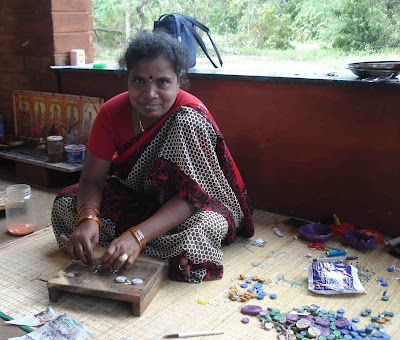After spending a week with WELLpaper's women self help groups near Pondicherry, I travelled to the southern tip of India, Kanyakumari to visit the NGO CHARDEP.
CHARDEP is based in the town Nagercoil, which is about 2o km north of Kanyakumari. It is run by the very dedicated, highly motivated and down-to-earth Mr. Manikandan and his team. They have several following programs which include Annapoorna Yatra, where they provide a daily meal for the homeless in the region. Another program is the HIV/AIDS treatment center, where they have a small clinic to provide regular treatment for HIV infected people. They also have women empowerment programs, which was the my main reason for my visit to Nagercoil.
Currently there are about 1500 self-help groups (SHGs), which are supported/mentored by CHARDEP. CHARDEP makes sure that they get credit from the local bank using their resources as guarantee, they distribute the money and make sure that the money is paid back to the bank in time. All of these self-help groups are coordinated by an outstanding woman Mrs. Mary, who does not have any formal education but knows how to manages about 10,000 men and women from the villages. As a mentor and as a friend, she connects outstandingly well with the women in the SHGs.
The first SHG we visited is in a village reached driving from Kanyakumari to Nagercoil. The women there are making stripes out of palm tree leaves, which are then later used in making hats. It was an amazing sight to see about 15 women sitting under a tree on a sunny day laughing, talking and at the same working on the palm leaves. The working hours there are flexible as the women need to take care of their household chores, thereforce most of the women work about 4 to 6 hours daily. In addition to earning money for their livelihood, they are happy just being part of the group creating something good out of the locally available resources.
Women working under a tree
Stripes made out of palm tree leaves
The next SHG we visited is in another village which is about 10 km from the first village. As the entire region is full of palm trees, the second SHG is also working with palm tree leaves. They get the palm tree leaves, cut them in half and wave them to make a sheet/slab which is used as a construction material for a roof of a hut or a fencing wall. Different in this SHG is the fact that some of the women are entrepreneurs. They lease the palm trees yearly, so that they have the much needed raw material and rest of the byproducts they can sell locally.
The working hours are flexible in in this SHG as well, women work whenever they have time during the day. Some of the women I spoke to are using the income in sending their children to better schools and colleges. One of the woman was very proud that she could send her son to a technical college in nearby town.
Women explaining to us about their work (note palm leave sheets which are used as mats)
Women who was skillfully cutting the palm leave into two (I was astonished to see the precision of her work)
In both the SHGs, I was happy to see that given a chance women can make a great impact in the society and bring the much needed socio-economic transformation in rural india.










